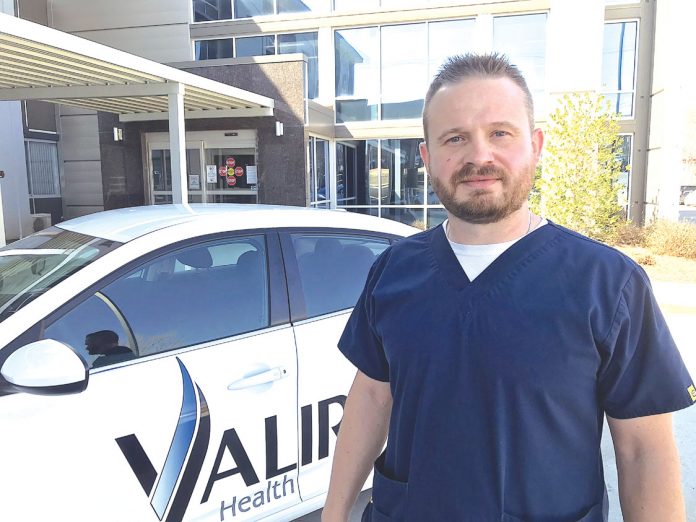by James Coburn – staff writer
Hospice is a calling for DJ Cox, LPN, an LPN at Valir Hospice in Oklahoma City. The purpose of hospice is to make a terminally ill patient comfortable until the end of life.
Hospice nursing has made Cox view life differently, especially in being compassionate for the people around him. He never knows who could be suffering in silence. He has known many people with cancer who continued to work, being sick without having a diagnosis.
“They don’t even know until it’s almost too late. And that’s where we get some patients all the sudden, and it’s a big scare for the whole family,” he said. “And it goes back to education and the whole team working together to make it work.”
He’s been with Valir Hospice for 12 years with part of that time as a CNA before becoming an LPN by going to Gordon Cooper Technology Cent in Shawnee. Cox is part of a team working to alleviate pain for patients nearing end of life.
“I just want to help them,” he said. “You really have to listen to their problems and address problems as well as the patient.” (story continues below)
Friday, April 1, 2022 | INTEGRIS HEALTH NURSE RECRUITMENT EVENT
Hospice care may be chosen by families suddenly to ease the passing of their loved ones. It’s important for the nurse to educate patients about the process.
“You’ve got to be direct. You can’t be soft with it. It’s best to give them the facts straight-forward in the beginning,” he said. “If you wait too long and you give them the hope that the patient might be better, even though they’re not, it’s wishful thinking. The prognosis is their death is their outcome. There are some that do get better and do come off, but it’s a rarity these days. Sometimes they last a little longer than the six months. But it’s a lot of education and a lot of pain control.”
Hospice requires an entire team of nurses, chaplains, nurse aides, social workers, and volunteers make all that fit together and make it work. It can’t only be one person, he said. There are no stipulations on faith. All are loved and cared for.
“We follow the guidelines of their faith so not to step on their toes. Sometimes you have to be educated about faiths to know what you cannot do at the end of life with them,” said Cox, a Christian. “With some people, you’re not allowed to touch the body. You’re not allowed to do certain things. To help them with that, the chaplains are very good at it.”
Hospice has made him more open to life. Some people don’t believe in God.
“But when you are doing this and you see the things that you see in their life, you know there is more to it than what is here,” he said. “And it makes me look at that totally different. It makes you want to be closer to your family and pay more attention to what’s going on in your family, and not to be so busy with life that you miss those moments because they become more important, and you don’t want to wait until they’re gone and have a regret.”
Besides kindness, a hospice nurse must be flexible with their schedule for unpredictable changes with their patients. It’s never two days being the same, he said.
Cox loves the people that he works with, and the management is excellent, Cox said. He draws energy by listening to patients’ stories, the things that they did before. Empathy cannot be dismissed, Cox said. Hospice nursing takes a compassionate person.
“You feel what they feel some days more than others,” Cox said. “You know that a loss is coming no matter what, no matter how much you think you’re prepared for it. It’s still a very emotional process.”
Many times, a hospice nurse hears that it’s best not to become too attached to their patients. But Cox said one’s heart becomes attached. Some patients will tell him they have lived the life they wanted to live, and that they are ready. That makes it so much easier, he said.
“The family is not always ready, but the patient is ready for it,” he continued. “As a patient told me once, sometimes it can be selfish to you here when you don’t want to be here.”
Cox has seen amazing things as a nurse. Many of his patients will speak of seeing family that is gone, he said.
“They reach for them, or they will tell you that they see them. And they will explain to you what they see, but they can’t tell you what is talked about. It’s a goose bump moment. It gets the hair on your neck standing up because you want to think that they’re confused at the end, but most of the time, the ones that are with it have been with it the whole time, and their explanations give you goose bumps. I’ve heard it hundreds of times from different patients the same thing.”
For more information on Valir Hospice visit:
https://www.valir.com/hospice-care













